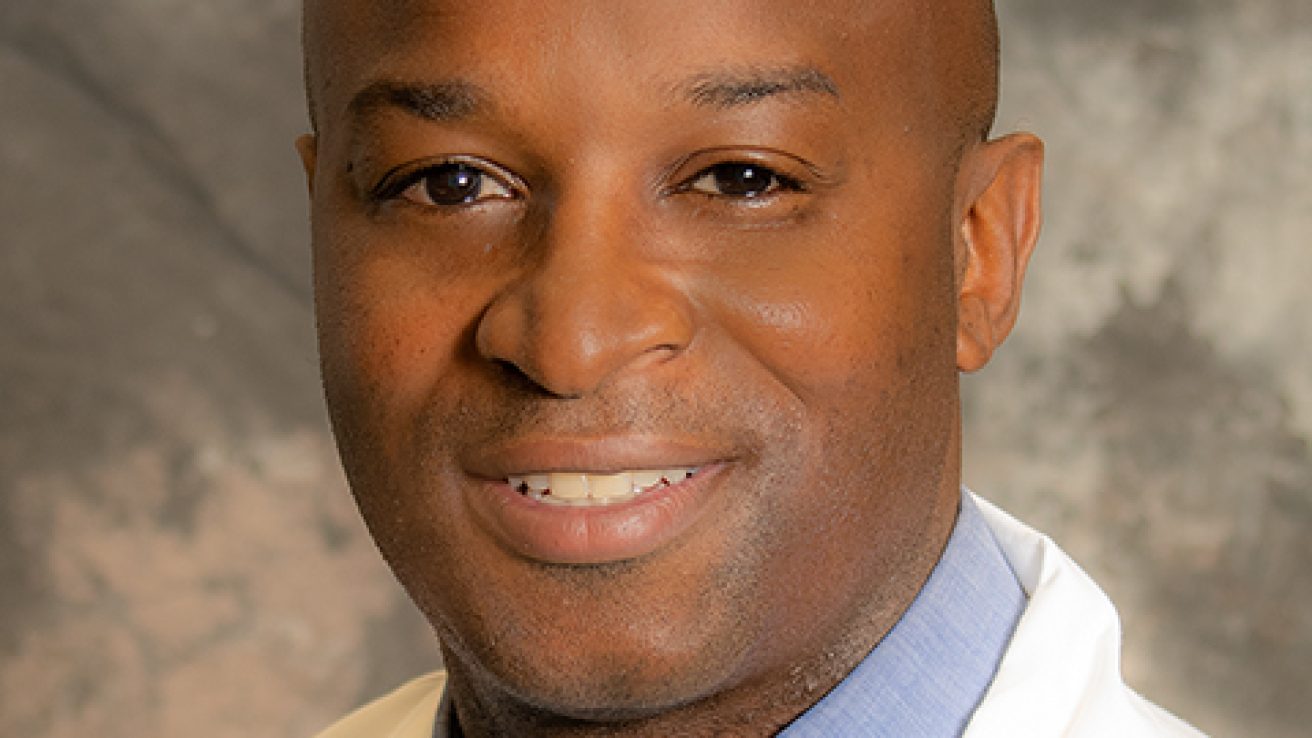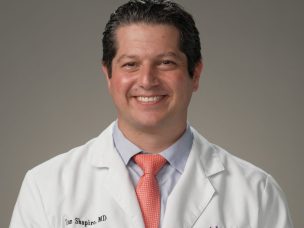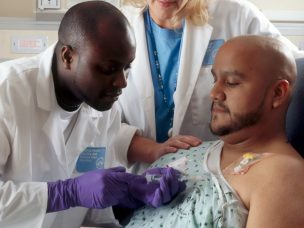In this MD Newsline exclusive interview with trauma surgeon Dr. Nii Darko, we discuss how to cross cultural barriers and build trust in patient care. We also discuss health equity, vaccinations, and clinical trials as they relate to minority communities.
MD Newsline:
How do you cross cultural barriers to connect with your patients?
Dr. Nii Darko:
“There’s so many different ways [to cross cultural barriers to connect with patients]. I think as a physician, or in general, you got to choose something that you’re really good at and hone in on that. Right? The main issue with medicine, particularly with minorities, is lack of representation. And lack of representation manifests in so many different ways.
If you don’t have enough doctors, then there’s certain assumptions that other doctors who are not minorities will make about their patients. Right? And if there’s not enough minority doctors, then they can’t speak up for minority patients, also. Right? So it’s a problem. Right?
So, [for example], hypertension occurs in Black and white people [and] for the most part [is] treated the same. But what we’re really starting to find is that there’s social determinants of that, also. Right? And then we’re also finding out [that] to some extent, medications work differently in people. Right?
We also found out that there was a study years ago that showed that there was a medical school where medical students came in, got surveyed, and some of them thought that the skin of Black people [was] thicker than [the skin of] white people. And how that manifests is that [Black people] can take pain more than other people. So they get pain medications less.
Or, the thought process is that ‘hey, well, maybe there’s a higher chance of addiction within Black people or minority populations. Let’s not give them opioid medications.’ See where I’m going with this?
So for me, what my mission is, is I just double down on my podcasts, communicating with people. Making it easier, more ubiquitous to say, ‘Hey, listen. This is how I talk. I talk just like you, and there’s nothing wrong with that. I got my D.O. degree. I got my M.B.A. degree. But I can sit down and talk to you about issues that occur in trauma surgery and appendicitis, and all these different things just the same way that you can understand it, and I try to make it as easy as possible to understand.’
So I think that my goal is to make communication, at least within the minority realm, so ubiquitous that it’s not even considered the minority thought process. It’s just this is an American view of doctors. It just so happens that they’re African American. Right? And that’s my goal. Because I think that once you say, ‘Black this, Black that, Black this,’ it gives other people, particularly who are not Black, an opportunity to [say], ‘yeah, I don’t want to hear that. That’s the Black experience.’
But when you make things so ubiquitous, and you talk about it so much without even mentioning the word ‘Black,’ they can’t ignore it. And it’s just like, ‘man. I can’t ignore it. It just so happens that these are Black people who are talking about this.’ Right?
It’s like watching Friends, right? But then watching Living Single, right? Living Single is exactly Friends. Friends is exactly Living Single. It just so happens that Living Single‘s an all-Black cast. But I personally enjoy Living Single. Right?
That’s what I want to do with my podcast. That’s what I want to do with eventually other podcasts and other forms of media. This is how we talk. This is how we communicate. This is how doctors do things. Let’s just do it. And let’s stop worrying about what other people think. Get that information out there.
And I think that will help younger people realize, ‘you know what? This is pretty dope. I want to be a doctor. I want to be able to talk how I talk and not have to worry about how my hair is, you know, keep my natural hair going, and keep who I am, and stuff like that. I don’t feel like I need to let that fall by the wayside.’ That’s my goal.”
MD Newsline:
How do you earn a patient’s trust?
Dr. Nii Darko:
“[How] you earn a patient’s trust is by one, taking yourself out of the picture and not to take things personally. But also at the same time understand that possibly the actions that you take, the prescriptions that you write, that can be part of the problem. Whenever I’m talking to my friends who are white or talking to doctors who are white, I tell them an example.
I did my residency at Morehouse School of Medicine in Atlanta, Georgia. I took care of a patient who was in his mid-sixties. He jumped over a fence. He broke his ribs. I took care of him in the ED. We did CT scans on him and noted that he had multiple rib fractures. I sent him home because he was complaining of pain, but he wasn’t in that much pain, so I thought.
He came back two days later. He was in respiratory failure. We ended up giving him pain medications, and he was ok. But one of my attendings, who’s in his sixties [or] seventies, took me to task in front of that patient. And [he] said, ‘You know what, you’re here as a Black physician at Morehouse School of Medicine, and you just practiced a health disparity.’
I’m like, ‘What are you talking about?’ He said, ‘You didn’t take his pain seriously. You possibly may have lacked the knowledge [needed] to treat this patient.’ And he just went through ‘X,’ ‘Y,’ and ‘Z’ and read me the riot act. And to this day—that’s what, over fifteen years ago—I’ve never forgotten that.
So even me as a Black physician, you know, born in Queens, New York, you know, raised in Newark, New Jersey, went to an HBCU for my residency, can practice a health care disparity. So if I can practice it, [sure,] someone who’s not from my community can do it. It’s not an accusatory thing of you’re going to do this. It’s just there’s these implicit biases that occur within medicine—the training in medicine—that helps us perpetuate these things.
So for someone who’s really interested in this [issue], the key thing is to depersonalize yourself and really think about what it’s like to be in that person’s shoes. What it’s like to come from a generation of people who hear, ‘Don’t you go to the doctor. They’re going to experiment on you.’ Why are they saying this? You have to understand and put yourself in that situation.
When I work in rural neighborhoods or suburban neighborhoods, when I look at a patient who happens to be Black, or non-white, or who happens to be white, I look at them as, if I let this patient die, their entire family—brother, sister, mother [,etc.]—[would be affected]. I humanize the patient. They’re an extension of their family. And I think a lot of times, I can’t speak for [everyone,] but I think that sense is sometimes lacking.
People don’t look at people as this is a father, this a mother, this is a daughter, this a brother, this is someone who is the primary breadwinner. So, therefore, in that sense, I have to do ‘X,’ ‘Y,’ and ‘Z’ to make sure that this person gets home and continues to be a part of society. Right? That’s really important.
The other thing too is asking [yourself], ‘what am I doing that’s part of the problem? How can I be a part of the solution?’ And ultimately, the best way, I think, is not going to Black Lives Matter meetings, or wearing a t-shirt that has a fist, none of that stuff.
It’s educating yourself. Understanding history. Understanding redlining. Understanding slavery. Understanding how all of these different social determinants have affected the health care of African Americans, of people from Latinx communities, of Native Americans, how rules, laws, all of these different things [have] an effect on them.
So, that’s what I would say to someone who is not Black, not of a minority background, but is interested in not being a part of the problem.”
MD Newsline:
How can we promote vaccinations and clinical trials in minority communities?
Dr. Nii Darko:
“This [question] is a tough one. Right? This [question] is a really tough one. Because you’re competing [against] physicians, the medical community, the government, we’re all competing against social media. We’re competing against so many different facts [and] alternative facts.
So now there’s the big push [for] African American doctors who are taking pictures, [sharing] on social media, sharing that they’ve gotten the vaccine, sharing the cards that show proof that they’ve gotten the vaccines. You know, there’s alternative social media campaigns that are saying that these doctors are being paid, or these doctors are being brainwashed in some form or fashion. So it’s very, very difficult.
The way [that] I handle it is I talk to my family about what I perceive to be the truth. Right? I tell them that I’ve looked at the studies. Right? I tell them that there are also in these studies people from minority communities who have participated in these studies. The people who are doing the studies, some of them are from minority backgrounds, which is very different from the past. Right?
So, you know, it’s one of those situations [where] we have a lot of work to do. There’s no one simple answer that I can say, and that’s going to change everybody’s mind. But it’s that continual, ‘guys, [look,] this information is real, the science is real, this is what can happen if we don’t do something [and] if we don’t act. Look at the information, look at the statistics.’
And you have to continue to talk about it in a very nonconfrontational, unbiased here’s the information [kind of] way. And it just goes to show you, it’s [2021], all of these things that have occurred, fifty, sixty years ago, they perpetuate. They have a long-lasting effect. We as physicians just have to learn, whether we are from minority communities or not, that we got to put in the work. Right? This is going to be a concerted effort.
And hopefully [when] this pandemic is over, the push to get people to get vaccinated, or the push for minorities to get involved in these clinical trials, whatever it may be, hypertension, diabetes, whatever it may be, we got to jump more into it. But also, at the same time, we got to push the government. We got to push the medical associations to include us in the decision-making process. Right?
We have to be able to say we want equity in this so that when we go back to our communities, we can show that we’re a part of the decision-making process also. That’s going to be tough, but that’s part of that continued cracking the glass [ceiling] so we can really break through and make some long-lasting effects in our community.”
Responses have been condensed and lightly edited.










